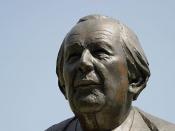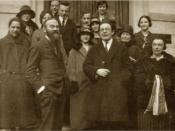Cognitive Learning Theory
Cognitive theory focuses on an unobservable change in mental knowledge. Cognitive came about as a rejection of the behaviorist views. Psychologists believed that mental events, or cognitivism, could no longer be ignored.
According to Blanton (2007), there are many general assumptions of cognitive learning theories such as some learning processes being unique to human beings and cognitive processes are the focus of the study. Another assumption of the theories is that objective, systematic observations of people's behavior should be the focus of scientific inquiry; however inferences about unobservable mental processes can often be drawn from such behavior. Cognitive theorists believe that learners are actively involved in the learning process and learning involves the formation of mental associations that are not necessarily reflected in overt behavior changes. They also believe that knowledge is organized and learning is a process of relating new information to previously learned information.
Furthermore, the cognitive learning theory has general educational implications.
Cognitive theorists believe that cognitive processes influence learning. They believe that as children grow, they become capable of increasingly more sophisticated thought. Another implication of this theory is that people organize things as they learn them and new information is most easily acquired when people associate it with things they have already learned. The most important educational implication of this theory is that people control their own learning (Blanton 2007).
According to Blanton (2007), working memory is the place where information currently being attended is stored. The place where the mind operates on information organizes it for storage or discarding, and connects it to other information. Sensory register and long term memory both provide information to the working memory. Often this happens at the same time. Regardless of input source, data stored in working memory is typically in linguistic form (especially when...


